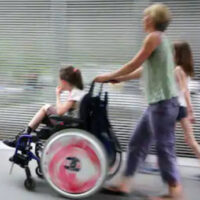Can a Child Receive Social Security Disability?

When a person becomes disabled, they may be eligible to receive one or more forms of disability benefits through the Social Security Administration (SSA), including Social Security Disability Insurance (SSDI) benefits or Supplemental Security Income (SSI) payments. SSDI is designed for disabled adults who have a sufficient work record such that they have paid into the insurance system and qualify for benefits. SSDI is not based on a person’s need, or having limited assets or limited income. Supplemental Security Income (SSI), however, is a type of benefit available to individuals with limited assets. Disabled adults often seek SSDI and SSI benefits, but what about children? There are circumstances in which children may be eligible to receive SSDI benefits and/or SSI benefits, depending on the specific circumstances. Our national disability benefits lawyers can explain in more detail, and we can speak with you about your case if you need help obtaining benefits.
Understanding the “Child’s” SSDI Benefit
The SSA refers to SSDI benefits paid to a disabled adult who has been disabled since childhood — before turning 22 years old, according to the SSA — as a “child’s” SSDI benefit because it is “paid on a parent’s Social Security earnings record.” How does this type of SSDI benefit work for a disabled child? One of the following must be true for a disabled person to be eligible for a “child’s” SSDI benefit:
- One of the child’s parent is currently receiving SSDI or Social Security retirement benefits; or
- One of the child’s parents must have died and have a sufficient work history to have been eligible for SSDI benefits.
The SSA also explains that SSDI Disabled Adult Child, or DAC, benefits will continue to be paid as long as the child has a disability and does not marry. When there is a child who is not disabled but has a disabled parent upon whom they depend, the child may be eligible to receive SSDI benefits, also based on the parent’s work record, but as part of the SSA’s family benefits. As the SSA explains, when a disabled adult qualifies for SSDI, their children may be eligible for benefits, too. A child can include a biological child, adopted child, or stepchild (and sometimes a dependent grandchild, too). To be eligible, the child must be unmarried, and either under 18 or 18-19 and a full-time high school student.
SSI for a Disabled Child
Unlike with SSDI benefits, children can qualify for SSI based on their disability separate from age or work history. To be eligible, the following must be true of the child:
- Earning less than $1,550 per month (or less than $2,590 per month if blind);
- Has a medical condition that “results in marked and severe functional limitations”; and
- Medical condition must be disabling for at least 12 months or expected to result in the child’s death.
Contact a National Social Security Disability Lawyer for Assistance
If you have any questions or concerns about seeking Social Security disability payments for your child or for the child of a disabled worker, it is important to seek advice from one of the experienced national SSDI benefits lawyers at the Law Offices of Stephen Barszcz. We can answer any questions you have, and we can assist you with an initial application for Social Security disability benefits or can help you to appeal a denial of benefits at any stage.
Sources:
ssa.gov/pubs/EN-05-10026.pdf
ssa.gov/benefits/disability/family.html






